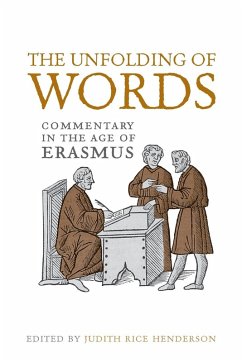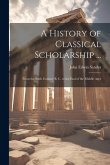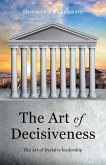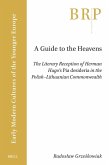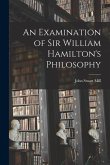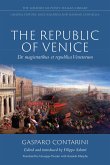- Broschiertes Buch
- Merkliste
- Auf die Merkliste
- Bewerten Bewerten
- Teilen
- Produkt teilen
- Produkterinnerung
- Produkterinnerung
The Unfolding of Words brings together international scholarship to explore crucial changes in writers' interactions with religious and classical texts.
Andere Kunden interessierten sich auch für
![A History of Classical Scholarship ...: From the Sixth Century B. C. to the End of the Middle Ages A History of Classical Scholarship ...: From the Sixth Century B. C. to the End of the Middle Ages]() John Edwin SandysA History of Classical Scholarship ...: From the Sixth Century B. C. to the End of the Middle Ages33,99 €
John Edwin SandysA History of Classical Scholarship ...: From the Sixth Century B. C. to the End of the Middle Ages33,99 €![Words for the Hour Words for the Hour]() Words for the Hour35,99 €
Words for the Hour35,99 €![The Art of Decisiveness The Art of Decisiveness]() Sheunesu E KasiamhuruThe Art of Decisiveness15,99 €
Sheunesu E KasiamhuruThe Art of Decisiveness15,99 €![A Guide to the Heavens A Guide to the Heavens]() Grze &A Guide to the Heavens94,99 €
Grze &A Guide to the Heavens94,99 €![Old Leaves: Gathered From Household Words Old Leaves: Gathered From Household Words]() William Henry WillsOld Leaves: Gathered From Household Words27,99 €
William Henry WillsOld Leaves: Gathered From Household Words27,99 €![An Examination of Sir William Hamilton's Philosophy An Examination of Sir William Hamilton's Philosophy]() John Stuart MillAn Examination of Sir William Hamilton's Philosophy31,99 €
John Stuart MillAn Examination of Sir William Hamilton's Philosophy31,99 €![The Republic of Venice The Republic of Venice]() Gasparo ContariniThe Republic of Venice30,99 €
Gasparo ContariniThe Republic of Venice30,99 €-
-
-
The Unfolding of Words brings together international scholarship to explore crucial changes in writers' interactions with religious and classical texts.
Produktdetails
- Produktdetails
- Verlag: University of Toronto Press
- Seitenzahl: 304
- Erscheinungstermin: 15. August 2024
- Englisch
- Abmessung: 229mm x 152mm x 25mm
- Gewicht: 445g
- ISBN-13: 9781487565251
- ISBN-10: 1487565259
- Artikelnr.: 72120996
- Herstellerkennzeichnung
- Libri GmbH
- Europaallee 1
- 36244 Bad Hersfeld
- gpsr@libri.de
- Verlag: University of Toronto Press
- Seitenzahl: 304
- Erscheinungstermin: 15. August 2024
- Englisch
- Abmessung: 229mm x 152mm x 25mm
- Gewicht: 445g
- ISBN-13: 9781487565251
- ISBN-10: 1487565259
- Artikelnr.: 72120996
- Herstellerkennzeichnung
- Libri GmbH
- Europaallee 1
- 36244 Bad Hersfeld
- gpsr@libri.de
Judith Rice Henderson is a professor in the Department of English and is active in the Classical, Medieval, and Renaissance Studies Program at the University of Saskatchewan.
Preface
Acknowledgements
Part One: Genres of Sixteenth-Century Commentary
One: Theory and Practices of Commentary in the Renaissance
Jean Céard, Université Paris-Ouest Nanterre La Défense
Part Two: The Biblical Scholarship of Erasmus
Two: Erasmus's Paraphrases: A 'New Kind of Commentary'?
Jean-François Cottier, Université Paris-7 Diderot and Université de
Montréal
Editor's Addendum: Translating an Erasmian Definition of Paraphrase
Judith Rice Henderson, University of Saskatchewan
Three: The Actor in the Story: Horizons of Interpretation in Erasmus's
Annotations on Luke
Mark Vessey, University of British Columbia
Four: The Function of Ambrosiaster in Erasmus's Annotations on the Epistle
to the Galatians
Riemer Faber, University of Waterloo, Ontario
Five: Erasmus's Biblical Scholarship in the Toronto Project
Robert D. Sider, Dickinson College, Carlisle, Pennsylvania and University
of Saskatchewan
Part Three: Religious Contexts of Printed Commentary
Six: 'Virtual Classroom': Josse Bade's Commentaries for the Pious Reader
Mark Crane, Nipissing University, North Bay, Ontario
Seven: Embedded Commentary in Luther's Translation of Romans 3
Gordon A. Jensen, Lutheran Theological Seminary, Saskatoon
Eight: Commenting on Hatred of Commentaries: Les Censures des Théologiens
Revised by Robert Estienne
Hélène Cazes, University of Victoria, British Columbia
Part Four: Developments in Humanist Philology
Nine: Rabelais's Lost Stratagemata (ca. 1539): A Commentary on Frontinus?
Claude La Charité, Université du Québec à Rimouski
Ten: Commentaries on Tacitus by Justus Lipsius: Their Editing and Printing
History
Appendix I: A Survey of Lipsius's Editions of Tacitus (Text and/or
Commentary)
Appendix II: The Praenomen of Tacitus: Why Lipsius Preferred Caius to
Publius
Appendix III: The Annotations in Leiden UL, 762 C 4 as Source of the
Curae secundae
Appendix IV: Lipsius's Evolving Commentaries: Two Examples in the 1585
Edition, Curae secundae, and 1588 Edition
Jeanine De Landtsheer, Katholieke Universiteit Leuven, Belgium
Bibliography
List of Contributors
Index
Acknowledgements
Part One: Genres of Sixteenth-Century Commentary
One: Theory and Practices of Commentary in the Renaissance
Jean Céard, Université Paris-Ouest Nanterre La Défense
Part Two: The Biblical Scholarship of Erasmus
Two: Erasmus's Paraphrases: A 'New Kind of Commentary'?
Jean-François Cottier, Université Paris-7 Diderot and Université de
Montréal
Editor's Addendum: Translating an Erasmian Definition of Paraphrase
Judith Rice Henderson, University of Saskatchewan
Three: The Actor in the Story: Horizons of Interpretation in Erasmus's
Annotations on Luke
Mark Vessey, University of British Columbia
Four: The Function of Ambrosiaster in Erasmus's Annotations on the Epistle
to the Galatians
Riemer Faber, University of Waterloo, Ontario
Five: Erasmus's Biblical Scholarship in the Toronto Project
Robert D. Sider, Dickinson College, Carlisle, Pennsylvania and University
of Saskatchewan
Part Three: Religious Contexts of Printed Commentary
Six: 'Virtual Classroom': Josse Bade's Commentaries for the Pious Reader
Mark Crane, Nipissing University, North Bay, Ontario
Seven: Embedded Commentary in Luther's Translation of Romans 3
Gordon A. Jensen, Lutheran Theological Seminary, Saskatoon
Eight: Commenting on Hatred of Commentaries: Les Censures des Théologiens
Revised by Robert Estienne
Hélène Cazes, University of Victoria, British Columbia
Part Four: Developments in Humanist Philology
Nine: Rabelais's Lost Stratagemata (ca. 1539): A Commentary on Frontinus?
Claude La Charité, Université du Québec à Rimouski
Ten: Commentaries on Tacitus by Justus Lipsius: Their Editing and Printing
History
Appendix I: A Survey of Lipsius's Editions of Tacitus (Text and/or
Commentary)
Appendix II: The Praenomen of Tacitus: Why Lipsius Preferred Caius to
Publius
Appendix III: The Annotations in Leiden UL, 762 C 4 as Source of the
Curae secundae
Appendix IV: Lipsius's Evolving Commentaries: Two Examples in the 1585
Edition, Curae secundae, and 1588 Edition
Jeanine De Landtsheer, Katholieke Universiteit Leuven, Belgium
Bibliography
List of Contributors
Index
Preface
Acknowledgements
Part One: Genres of Sixteenth-Century Commentary
One: Theory and Practices of Commentary in the Renaissance
Jean Céard, Université Paris-Ouest Nanterre La Défense
Part Two: The Biblical Scholarship of Erasmus
Two: Erasmus's Paraphrases: A 'New Kind of Commentary'?
Jean-François Cottier, Université Paris-7 Diderot and Université de
Montréal
Editor's Addendum: Translating an Erasmian Definition of Paraphrase
Judith Rice Henderson, University of Saskatchewan
Three: The Actor in the Story: Horizons of Interpretation in Erasmus's
Annotations on Luke
Mark Vessey, University of British Columbia
Four: The Function of Ambrosiaster in Erasmus's Annotations on the Epistle
to the Galatians
Riemer Faber, University of Waterloo, Ontario
Five: Erasmus's Biblical Scholarship in the Toronto Project
Robert D. Sider, Dickinson College, Carlisle, Pennsylvania and University
of Saskatchewan
Part Three: Religious Contexts of Printed Commentary
Six: 'Virtual Classroom': Josse Bade's Commentaries for the Pious Reader
Mark Crane, Nipissing University, North Bay, Ontario
Seven: Embedded Commentary in Luther's Translation of Romans 3
Gordon A. Jensen, Lutheran Theological Seminary, Saskatoon
Eight: Commenting on Hatred of Commentaries: Les Censures des Théologiens
Revised by Robert Estienne
Hélène Cazes, University of Victoria, British Columbia
Part Four: Developments in Humanist Philology
Nine: Rabelais's Lost Stratagemata (ca. 1539): A Commentary on Frontinus?
Claude La Charité, Université du Québec à Rimouski
Ten: Commentaries on Tacitus by Justus Lipsius: Their Editing and Printing
History
Appendix I: A Survey of Lipsius's Editions of Tacitus (Text and/or
Commentary)
Appendix II: The Praenomen of Tacitus: Why Lipsius Preferred Caius to
Publius
Appendix III: The Annotations in Leiden UL, 762 C 4 as Source of the
Curae secundae
Appendix IV: Lipsius's Evolving Commentaries: Two Examples in the 1585
Edition, Curae secundae, and 1588 Edition
Jeanine De Landtsheer, Katholieke Universiteit Leuven, Belgium
Bibliography
List of Contributors
Index
Acknowledgements
Part One: Genres of Sixteenth-Century Commentary
One: Theory and Practices of Commentary in the Renaissance
Jean Céard, Université Paris-Ouest Nanterre La Défense
Part Two: The Biblical Scholarship of Erasmus
Two: Erasmus's Paraphrases: A 'New Kind of Commentary'?
Jean-François Cottier, Université Paris-7 Diderot and Université de
Montréal
Editor's Addendum: Translating an Erasmian Definition of Paraphrase
Judith Rice Henderson, University of Saskatchewan
Three: The Actor in the Story: Horizons of Interpretation in Erasmus's
Annotations on Luke
Mark Vessey, University of British Columbia
Four: The Function of Ambrosiaster in Erasmus's Annotations on the Epistle
to the Galatians
Riemer Faber, University of Waterloo, Ontario
Five: Erasmus's Biblical Scholarship in the Toronto Project
Robert D. Sider, Dickinson College, Carlisle, Pennsylvania and University
of Saskatchewan
Part Three: Religious Contexts of Printed Commentary
Six: 'Virtual Classroom': Josse Bade's Commentaries for the Pious Reader
Mark Crane, Nipissing University, North Bay, Ontario
Seven: Embedded Commentary in Luther's Translation of Romans 3
Gordon A. Jensen, Lutheran Theological Seminary, Saskatoon
Eight: Commenting on Hatred of Commentaries: Les Censures des Théologiens
Revised by Robert Estienne
Hélène Cazes, University of Victoria, British Columbia
Part Four: Developments in Humanist Philology
Nine: Rabelais's Lost Stratagemata (ca. 1539): A Commentary on Frontinus?
Claude La Charité, Université du Québec à Rimouski
Ten: Commentaries on Tacitus by Justus Lipsius: Their Editing and Printing
History
Appendix I: A Survey of Lipsius's Editions of Tacitus (Text and/or
Commentary)
Appendix II: The Praenomen of Tacitus: Why Lipsius Preferred Caius to
Publius
Appendix III: The Annotations in Leiden UL, 762 C 4 as Source of the
Curae secundae
Appendix IV: Lipsius's Evolving Commentaries: Two Examples in the 1585
Edition, Curae secundae, and 1588 Edition
Jeanine De Landtsheer, Katholieke Universiteit Leuven, Belgium
Bibliography
List of Contributors
Index

